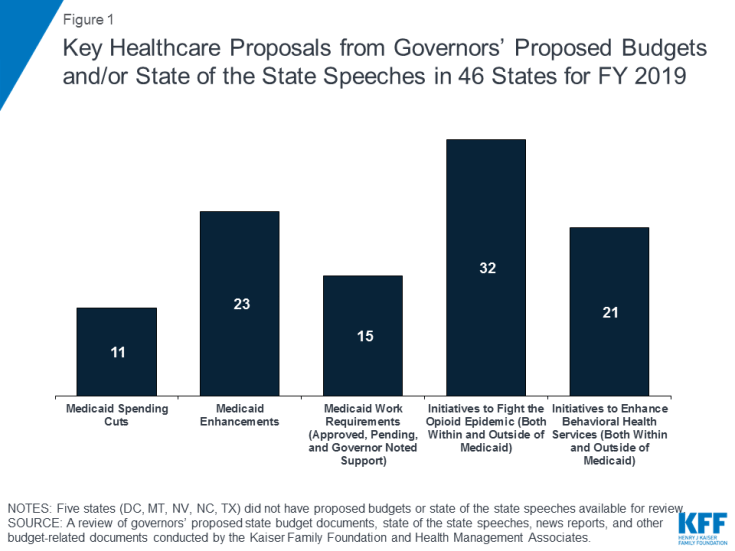Governors’ Proposed Budgets for FY 2019: Focus on Medicaid and Other Health Priorities
This issue brief provides Medicaid highlights from governors’ proposed budgets for state fiscal year (FY) 2019 (July 1, 2018 through June 30, 2019 in most states).1 Proposed budgets reflect the priorities of the governor and are often blueprints for the legislature to consider. In total, we reviewed 39 proposed state budgets2 and text from 46 state of the state speeches.3 This review revealed that while state revenue collections improved in 2017 compared to 2016, considerable economic and regional variation persists, many states are facing significant budget challenges unrelated to Medicaid such as unfunded pension liabilities or falling oil prices, and the outlook for 2018 remains uncertain due, in part, to the impacts of the 2017 Federal Tax Reform Act.
Key health findings include:
- Addressing the opioid and substance use disorder crisis is a high priority for governors across the country. At least 32 governors have Medicaid or non-Medicaid proposals to address opioid challenges and many also proposed other behavior health initiatives (Figure 1).
- Despite some budget challenges and differing state responses to Medicaid and ACA reforms, governors are proposing more Medicaid enhancements (23 governors) compared to Medicaid spending cuts (11 governors). The most frequently proposed type of enhancement was increasing community-based long-term services and supports.
- Fifteen states either have work requirement waivers approved or pending at CMS, or have governors that have noted support for pursuing a work requirement waiver.
- Governors are proposing a number of other Medicaid and non-Medicaid health-related initiatives, including ACA-related coverage changes (such as proposals to adopt the ACA Medicaid expansion in Virginia,4 adopt a “financially prudent” Medicaid expansion in Utah,5 and pursue both a Section 1115 and a Section 1332 waiver in Idaho) and broader public health proposals (including proposals related to women’s or children’s health, LTSS, and provider supply).

